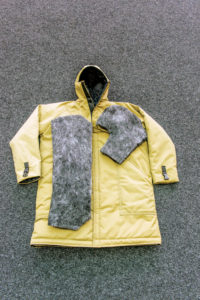
The idea of sustainability is attractive to business owners and consumers. Executing on sustainability is not simple, however. In practice, sustainability can depend on a partnership of companies working together.
Wm. T. Burnett & Co., Baltimore, Md., a foam and nonwoven materials manufacturer, transforms recycled water bottles from General Motors facilities and the city of Flint, Mich., into noise-dampening car engine covers, HVAC filters and fleece coats. The coats, intended for homeless people, transform into sleeping bags.
“It’s a way of initiating jobs in the U.S. along with recycling,” says Sabrina Kilmer, global specialty account manager at Wm. T. Burnett & Co. “It’s actually a profitable program that’s supporting and sustaining in the U.S.”
The Empowerment Plan, a Detroit-based nonprofit, employs homeless women to create the transformable coats from recycled material. The coats are shipped throughout the U.S. and more than 10 other countries. While creating approximately 6,000 transformable coats per year, these employees learn a new trade. Wm. T. Burnett & Co.’s Recycled EcoWeb material was primarily created to assist in GM’s Do Your Part program, an 11-company partnership with the goal of creating jobs through sustainable business practices.
The process begins in Michigan where bottles are collected, cleaned and turned into dense plastic flake. The flake is then turned into resin and later into fiber. Wm. T. Burnett & Co. then purchases the fiber and makes it into batting at its Statesville, N.C., manufacturing plant. Once the batting process is completed, it’s used for noise-dampening car engine covers, HVAC filters and coats for The Empowerment Plan.
Flint once flourished as home to the nation’s largest General Motors plant, but in recent years has faced economic challenges. In 2014, Flint’s drinking water was discovered to be contaminated with lead. As a result, Flint citizens use an excessive amount of bottled water. Repurposing the excess of water bottles from Flint contributes to solving problems by reducing further pollution in the state.
“What we’re trying to get across is the web of different companies that are all coming together to create jobs in the U.S. from the recycled material,” Kilmer says. “Places already say they recycle bottled material all the time, but what they don’t show is where it comes from in the beginning all the way to the end.”
Peter Diamond is the digital content coordinator for IFAI publications.
 TEXTILES.ORG
TEXTILES.ORG


